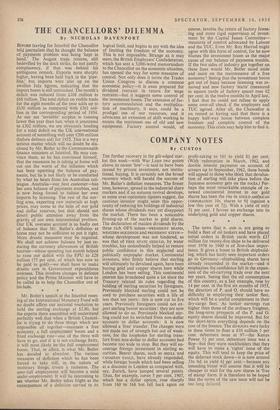COMPANY NOTES
By CUSTOS
THE further recovery in the gilt-edged mar- ket this week—with War ,Loan two points above its recent 'low'—is said to have been caused by private investment, not institu- tional, buying. It is certainly not the broad recovery which will herald the success of Mr. Butler's deflation measures. The firmer tone, however, spread to the industrial share markets and if an autumn revival develops, as some over-optimistic tipsters suggest, the cautious investor might seize this oppor- tunity of reducing his holdings of industrial shares whose dividends may yet disappoint the market. There has been a noticeable firming-up of the market in gold shares. The declaration of maiden dividends by the three rich OFS mines—PRESIDENT BRAND, WESTERN HOLDINGS and PRESIDENT STEYN- whose development was not hindered, as was that of FREE STATE GEDULD, by water troubles, has undoubtedly helped to restore public confidence in this neglected and politically unpopular market. Continental investors, who firmly believe that sterling will ultimately be devalued again, have been buying gold and copper shares here while London has been selling. This continental interest has broadened quite a lot since the Treasury relaxed its rules regarding the holding of sterling securities by foreigners. Previously blocked sterling could not be used to purchase securities with a life of less than ten years : this is now cut to five years. Previously foreigners could not ex- port sterling bearer securities : they are now allowed to do so. Previously blocked ster- ling could not be switched from non-dollar accounts to dollar accounts : it is now allowed a 'free' transfer. The changes were not made out of strength but out of weak- ness, for the loopholes for sterling trans- fers from non-dollar to dollar accounts had become too wide to stop. But they will en- courage foreign investment in sterling se- curities. Bearer shares, such as SHELL and CANADIAN EAGLE, have already responded, while foreign bonds which had been selling at a discount in London as compared with, say, Zurich, have jumped several points. Thus, for example, JAPAN 5 per cent. 1907, which has a dollar option, rose sharply from 160 to 168 but fell back again on profit-taking to 161 to yield 81 per cent. (With redemption in March, 1962, and double interest payments on account of arrears up to September, 1962, these bonds will appeal to those who think that devalua- tion of sterling will take place before the Japanese economy gets on the rocks.) Per- haps the most remarkable example of re- newed continental interest in our gold shares has been the rise in ANGLO-AMtRICAN CORPORATION 10s. shares to 9+ (against a low this year of 7f). With a yield of only 31 per cent. I favour an exchange into its underlying gold and copper shares.
The news that P. AND o. are going to build a fleet of oil tankers and have placed initial orders in British yards worth £37 million for twenty-five ships to be delivered over 1958 to 1960 is of first-class impor- tance. It gives a boost to British shipbuild- ing, which has lately seen important orders go to Germany—shipbuilding shares have already responded in the market—and it emphasises the confidence felt in the expan- sion of the oil-carrying trade over the next ten years. Seeing that the oil consumption of this country, as a fair example, rose by 14 per cent. in the first six months of 1955, the directors of P. and 0. should have no difficulty in employing their tanker fleet, which will be a useful complement to their dry-cargo fleet. As tanker earnings run higher than those of the ordinary freighter, the long-term prospects of the P. and 0. equity shares should be improved. But for the short-term everything depends on the cost of the finance. The directors were lucky in these times to float a £10 million 5 per cent. debenture issue at 97—the Kenya Power 51 per cent. debenture issue was a flop—but they warn stockholders that they will have to make a 'rights' issue of the equity. This will tend to keep the price of the deferred stock down—it is now around 33s. 9d. to yield 4+ per cent.—because any intending buyer will assume that it will be cheaper to wait for the new shares in 'free of stamp' form. It is therefore to be hoped that the terms of the new issue will not be too long delayed.


































 Previous page
Previous page